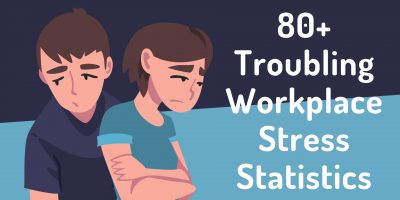
80+ Troubling Workplace Stress Statistics for 2024
Address workplace stress head-on with practical solutions to encourage a healthier, more productive work environment.


Co-Founder of Well & Truly Workshops

Founder of Shift Clinics

Founder of Nature’s Sleep

Fitness Trainer & Co-Founder of Totalshape
Sleep has become a luxury in our fast-paced and high-pressure lives.
We have normalized sacrificing sleep for work and working more to make up for lost productivity – inadvertently creating a vicious cycle.
However, our modern “hustle” culture fails to recognize that your “beauty sleep” is strongly linked to job performance, mental health, and productivity.
This article explores this link between sleep and productivity and sheds light on the health and business implications of poor rest.
How often have you slept the recommended seven hours of sleep and still felt tired and unproductive during the daytime?
Although sleep duration is the most commonly investigated sleep measure, it may be misleading as it only considers the quantity and not the quality of rest. Good sleep health means that an individual regularly gets enough sleep at appropriate times, without any sleep disturbances or disorders.
About 70 million Americans have untreated sleep disorders like insomnia, sleepwalking, or restless legs syndrome that prevent them from getting quality sleep. Men are more likely to have sleep-related breathing disorders like loud snoring and obstructive sleep apnea, while women are more affected by life events, depression, illness, medication use, and physical or hormonal changes.
In the long term, untreated sleep disorders are associated with a plethora of serious illnesses, including:
We spend nearly a third of our lives sleeping.
As such, the quality of our sleep is directly correlated to our quality of life. Simply put, good sleep hygiene is necessary for good health. Along with exercise and nutrition, sleep is one of the three pillars of a healthy lifestyle.
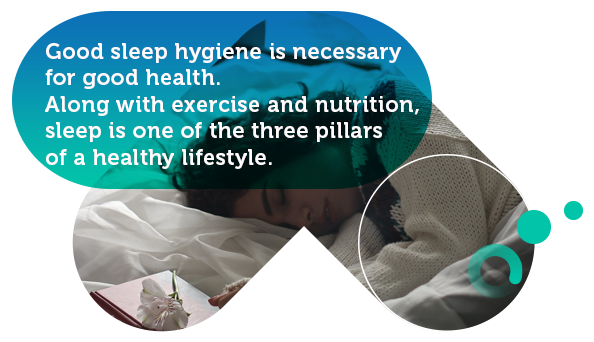
While wellness has garnered a lot of attention in recent years, the influence of sleep on well-being is often overlooked. Sleep and well-being are interconnected and have a two-way relationship, meaning that sleep impacts many aspects of well-being and vice versa.
Sarah Phillips, Co-Founder of Well & Truly Workshops, gave an insightful view on the connectedness of wellness, sleep, and productivity by stating, “At Well & Truly Workshops, a company specializing in well-being and productivity, we teach that sleep is really the number one priority for both well-being and productivity.
Without adequate sleep, memory and decision-making functions are impaired. We also become more driven by our emotional responses, so our behavior can become more irrational. This is obviously not ideal for our productivity and collaboration.
Kathryn, my co-founder, has a 7-month-old baby, and on the weeks where she’s unable to sleep as much as she needs to, she explains that her train of thought constantly wanders, and she has bad brain fog.”
You might be wondering, how does sleep improve concentration and productivity?
Sleep affects nearly every system in our body and supports many endocrine, metabolic, and neurological functions. When you sleep, your body rests, rejuvenates, and rebuilds itself through four to six sleep cycles consisting of rapid eye movement (REM) and non-rapid eye movement (NREM) sleep.
On the other hand, research shows that after 17 to 19 hours of wakefulness, the performance of an individual on a range of tasks is equivalent to a person with a blood-alcohol level of 0.05 percent, which is the legal drinking limit in many countries.
Therefore, we can deduce that healthy sleep promotes physical health, mental well-being, and increased job performance.
Yet, as mentioned in Shortlister’s sleep statistics, 35% of U.S. adults are not getting the recommended seven to nine hours of sleep. Insufficient sleep can have a cascading bad effect on an individual and cause severe sleep deprivation in the long run.
Getting enough sleep can be a challenge due to our busy lifestyle, environmental factors, and work responsibilities. Aren’t we all guilty of occasionally staying up late, pulling an all-nighter, or drinking that cup of coffee after sunset?
But what happens to us when we lose sleep?
Turns out, even losing one or two hours of sleep can impact your mood and overall health. However, not getting enough sleep regularly can have severe consequences and sleep deprivation.
Marc Werner, Founder of Naturessleep, shared an observation on the consequences of sleep deprivation. Marc stated, “If you’re not sleeping well, your mental and physical health will suffer. This is not just about feeling tired or lacking energy.
Sleep deprivation can lead to weight gain, heart disease, diabetes, high blood pressure, and even depression.
A good night’s sleep is the key to a productive day. It is worth investing in a sleep wellness product that can help you get a deep sleep and enjoy the benefits of a healthy life.”
Some common signs to watch out for sleep deprivation include:
Best-in-class companies spend a significant amount of time and resources trying to identify sources of competitive advantage. Whether that’s upskilling their workforce, improving the employee experience, or investing in the latest software and innovations, optimizing the productivity of their workforce is a top priority.
However, many organizations overlook one simple and powerful way to improve work performance – having a well-rested workforce.
Inadequate rest impairs our ability to think, handle stress, moderate emotions, and maintain a healthy immune system. So, how does sleep affect performance?
The work performance of sleep-deprived employees is affected in many ways.
If you’ve ever nodded off at your desk or dozed off during an important meeting, you know that sleep loss can negatively impact work performance. Fatigue at the workplace is related to different economic outcomes and significant losses of productive time.
One study found that 38% of employees experienced fatigue while at work during the previous two weeks. In addition, sleep deprivation makes us less creative, less innovative, and proactive.
Without adequate sleep, employees have difficulty focusing on complicated tasks and staying on top of projects.
Difficulty concentrating and learning, memory lapses, and declined problem-solving abilities are frequently associated with a bad night’s sleep. Diminished cognitive capacity may have severe consequences for professionals whose job demands high alertness and attention to detail, such as surgeons, drivers, and machine operators.
Undoubtedly, sleep deprivation makes us moody, more irritable, and grumpy.
Work performance and relationships may be compromised as we’re less tolerant of coworkers’ opinions and more prone to outbursts and other negative workplace attitudes.
Nearly half of all American workers reported that sleep had a significant impact on their mood at work. Strained work relationships impact the entire organization and may make it difficult for employees to collaborate, leading to job inefficiency and financial losses for the business.
Clearly, excessive sleepiness can cause serious problems in both personal life and the workplace. An overwhelming amount of evidence suggests that sleep deprivation leads to workplace accidents.
In fact, sleepy employees are 70% more likely to be involved in a workplace accident or sustain an occupational injury. Sleepiness is also often cited as the primary or secondary cause of industrial and motor vehicle accidents.
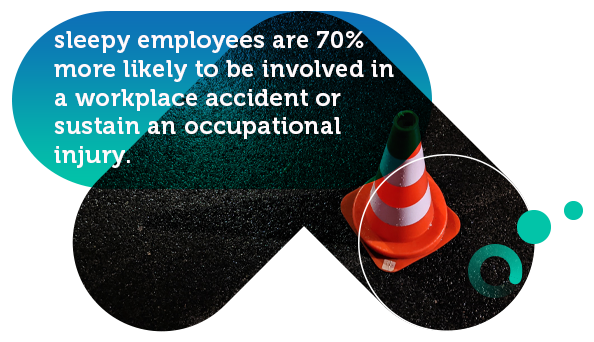
Nowadays, organizations are globally connected and expanding their operations across continents. As a result, more employees have to work odd hours, often staying up late at night or early morning.
Having said that, a poor night’s sleep is often cited as a reason for unscheduled absenteeism.
Typically, the average worker has 0.91 days of unplanned absences each month. In comparison, workers who get poor night’s sleep report 2.29 days of unplanned absenteeism each month.
This unplanned absenteeism due to poor sleep among workers costs the U.S. economy $44.6 billion each year.
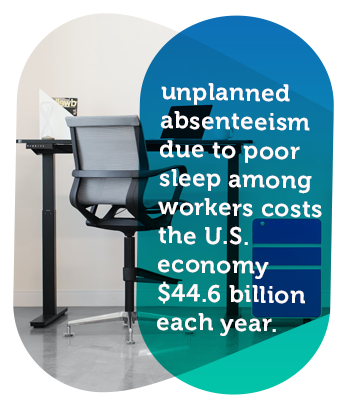
While the link between lack of sleep and work performance clearly shows the adverse effects, the opposite is also true.
Great sleep leads to workers feeling more relaxed, more engaged in their communities through volunteering and donating, and having an overall better mood. Studies suggest that being well-rested motivates individuals to achieve more, experience their lives more positively, and positively contribute to the world surrounding them.
Forward-thinking companies that embrace a culture of well-being in their workplace, raising the topic of sleep within their wellness programs will yield a great return on their investment.
This includes educating employees on the importance of building healthy habits, workplace stress management, and other ways to improve employee well-being. Highlighting the importance of following a bedtime routine and optimizing the sleep environment may help eliminate sleep problems.
Furthermore, around one-third of companies also offer some type of sleep program. Most commonly provided sleep support approaches include:
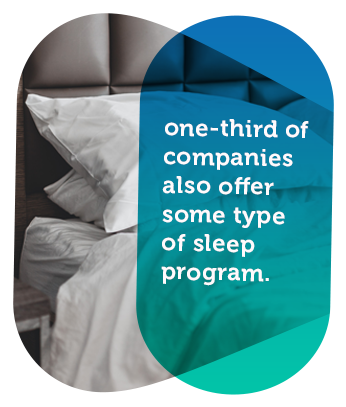
Katherine Maslen, Founder of Shift clinics, stated, “There is an absolute link between sleep and productivity, and this is research-backed. Paradoxically, stress and overwhelm at work can impact sleep, so it is vital to work on both stress and sleep to improve productivity in the workplace.
Working on sleep involves regulating the sleep/wake cycle and dealing with stress. This is about educating people on sleep hygiene, reducing stimulants, and working on mindfulness and trauma release to help quiet the internal dialogue that often heightens stress.”
By treating sleep as an integral part of the wellness dimension, employers can simultaneously improve the lives of their employees and attain the highest business performance levels.
A wealth of research supports the strong link between sleep and productivity.
And yet, many companies are known to have a “long-hours culture” without realizing the adverse effects on performance. In fact, the main driver of poor sleep is “work overload.”
This type of work culture can quickly wear down morale as workers begin to feel the strain of the long work hours.
Many case studies have brought attention to the importance of sleep for elite athletes, performers, musicians, and even politicians. However, businesses seem to lag behind in acknowledging sleep as the ultimate performance enhancer.
When asked to explain the connection between sleep and productivity, Isaac Robertson, Fitness trainer & Co-Founder of Totalshape, shared their observation after eight years of working in the health & fitness sector. Issac stated,
“Attempting to work while sleep-deprived can have a major negative influence on job performance.
Processes across the body perform sub-optimally when you don’t get enough sleep. Overworked neuronal networks in the brain impede thinking, inhibit physical reactions, and leave people emotionally exhausted.

And just how widespread is the problem of sleep insufficiency?
Numerous studies point out just how frequently we skimp out on good sleep.
One report found that one in three American adults (33%) or around 84 million people described their sleep as poor. Another Harvard study estimated 11.3 days of lost productivity among poor sleepers. Altogether, lack of adequate sleep is causing one-third of the population to lose almost two work weeks’ worth of productivity every year.
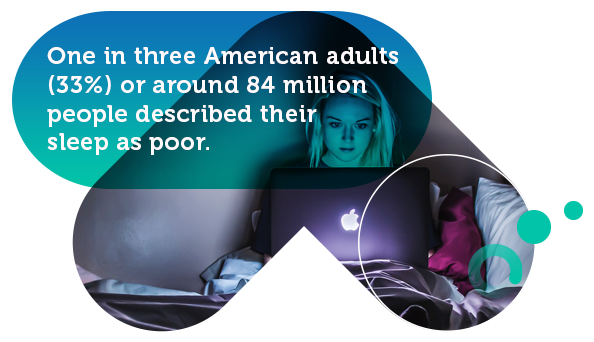
Sleep-related health issues increased healthcare costs, and productivity loss are hidden costs that seriously affect business performance.
Today’s dynamic work culture glorifies working harder, feeling burnt out, and sacrificing sleep.
We have created a bizarre culture around sleep where it is customary to brag about sleeping only four hours every night – as if the key to being successful is sleeping less.
Managers and leaders need to be aware of the tradeoff between employees working long hours or being available 24/7 and the financial impact of poor sleep.
As companies commit to a culture of health, they need to reevaluate workloads and ensure a better work-life balance.
Sleep is not optional; it is a vital function for us to function and perform optimally.
As such, sleep should be considered a top priority and an essential element of workplace health. Employers that recognize the connection between sleep and productivity provide resources and support healthy sleep to gain a significant competitive advantage.
Browse our curated list of vendors to find the best solution for your needs.
Subscribe to our newsletter for the latest trends, expert tips, and workplace insights!

Address workplace stress head-on with practical solutions to encourage a healthier, more productive work environment.

Companies thrive when their teams are happy, healthy, and engaged—but what are the steps to making a wellness program that supports these outcomes?

Explore crucial employee wellness statistics to enhance workplace well-being and productivity.

Discover flexible benefits plan’s role in improving recruitment and retention levels and satisfying employees’ needs.
Used by most of the top employee benefits consultants in the US, Shortlister is where you can find, research and select HR and benefits vendors for your clients.
Shortlister helps you reach your ideal prospects. Claim your free account to control your message and receive employer, consultant and health plan leads.